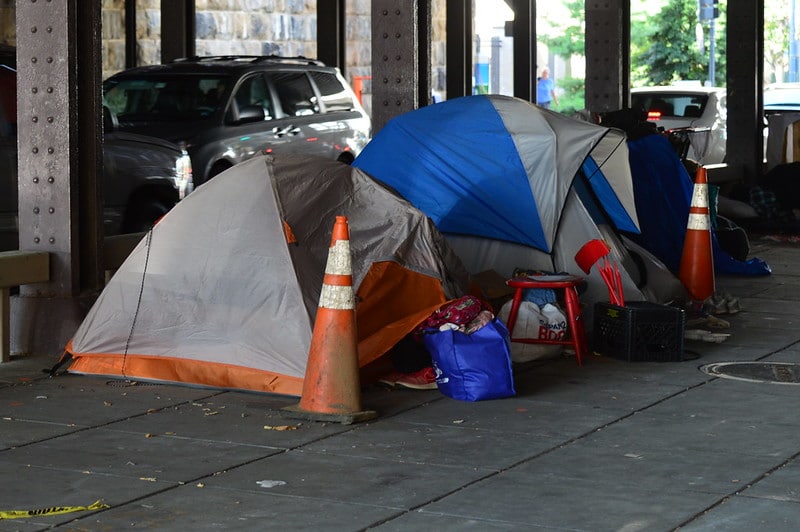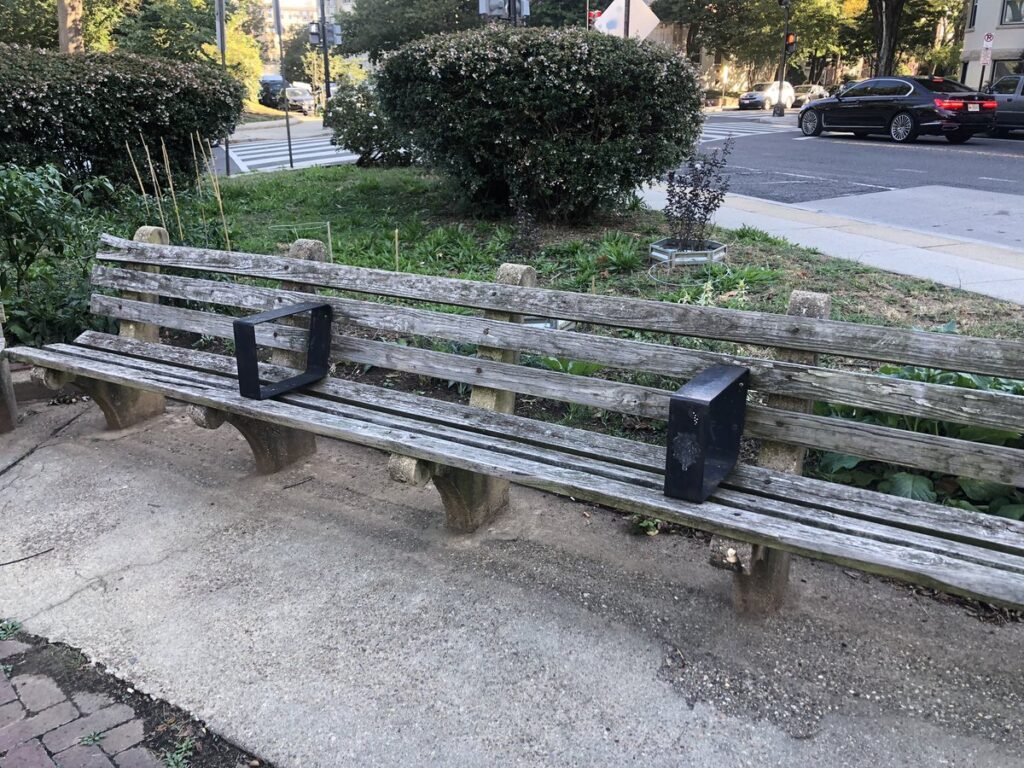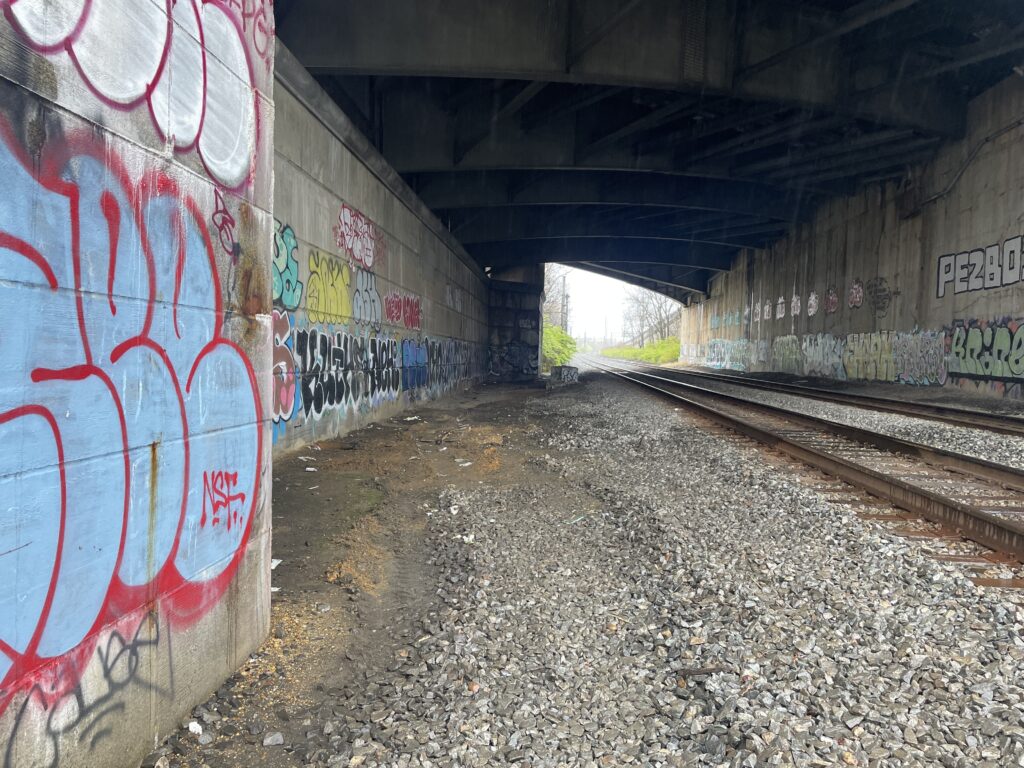According to the Washington Legal Clinic for the Homeless, the presence of an advocate or official observer at a homeless encampment cleanup can help to ensure that homeless occupants are treated with respect and adherence to the city’s protocol. Due to their small staff, the Clinic has been recruiting volunteers to observe these city-led “cleanups” of homeless encampments, and advocate on behalf of homeless individuals who live in the encampments located throughout the city and may not know their rights. Several training sessions for new observers have been held so far.
During a training in October, Ann Marie Staudenmaier, a staff attorney for the Legal Clinic, said these group encampments have increased within the last five years. Before that, unsheltered people were usually more hidden, such as in bushes or under bridges. She attributed this shift to a few “well-intentioned” individuals who took it upon themselves to hand out tents to people experiencing homelessness, as well as big retail stores such as Walmart and REI moving into the District. According to Staudenmaier, an incident in 2003 ultimately led to the city’s policy that now guides encampment clean-ups.
A resident of a high-rise in Georgetown had complained to the city that he could see an encampment from his home and city workers threw the encamped persons’ property away. The Legal Clinic referred the person whose belongings were destroyed in Georgetown to private attorneys who helped him sue the city for a small amount of damages. The group also reached out to the city administrator at the time to discuss the city’s potential liability for incidents where they disposed of someone’s personal belongings without due process. This led to the creation of a task force that drafted the first version of D.C.’s Protocol for the Disposition of Property Found on Public Space, which was adopted in 2005 and has been updated several times since.
According to D.C. law, it is not illegal to sleep in public. However, since 1981, it has been a ticketable offence to “set up, maintain, or establish any camp or any temporary place of abode in any tent, wagon, van, automobile, truck, or house trailer, of any description, or in any combination, on public or private property, without the consent of the Mayor.” Despite this regulation, city officials allow the people living in encampments 15 days notice before an encampment cleanup takes place. In past interviews, the Office of the Deputy Mayor of Health and Human Services has said that their “encampment engagements” do not aim to enforce this law and only respond to sites that have been deemed a public health risk.
When an encampment cleanup takes place, Department of Public Works trucks, MPD officers, outreach workers, and a representative from the deputy mayor’s office usually begin the cleanup around 10 a.m.
As Street Sense Media has previously reported, many encamped people have learned to move their belongings to the end of the block to wait for the cleanup to end, before moving the encampment right back to where it was. At the Oct. 3 training, Staff Attorney Karen Malovrh characterized this behavior as a cat and mouse game, calling the city’s effort a “huge waste of time and money only to drive people crazy.” DMHHS responded, saying, “The reason we engage an encampment protocol engagement is when there is a health or safety risk both for residents living in the encampments and the greater community, and the amount of biohazards that we pick up in NoMa is not safe for residents that are living there, and if we did not do cleanups on a regular basis those items would pile up.”
Because camping in public is illegal, it is difficult to find a legal defense to protect people who live in the city’s many encampments. However, there are legal grounds to protect private property left in public space. For example, when someone’s car is illegally parked, the car is not destroyed, it is ticketed or towed. Likewise, the city’s own protocol mandates the storage of private property up to “disassembled tents” and personal property that can fit in up to two 40-gallon bins. In a 2018 interview with, a spokesperson for the deputy mayor’s office said bins are kept in city vehicles present for the cleanup and are available upon request.
Regardless, this is not always how cleanups have been conducted, according to Malvorh. She described one incident where outreach workers were listening to music instead of speaking with camp residents, and others where tents have been picked up with the intent to trash them without checking inside for personal property such as vital documents, irreplaceable items such as family photos, or other items of high value. DMHHS responded to this saying outreach workers were probably communicating with DMHHS reporting their whereabouts and objectives in real-time for safety reasons.
The Legal Clinic is optimistic that a recent change in personnel for who oversees the encampment cleanups on behalf of the deputy mayor will lead to more consistent adherence to the protocol.
In March of 2018, two homeless residents filed a class-action lawsuit against the city seeking an injunction ordering the District not to destroy the unattended personal belongings of homeless residents without first storing them for 60 days so they can be reclaimed. They are represented by the law firm Covington and Burling LLP. The case is ongoing.








